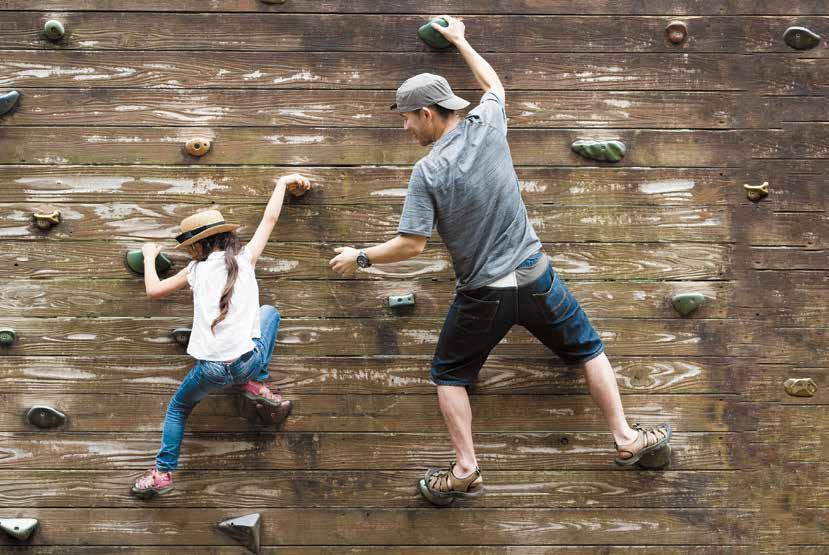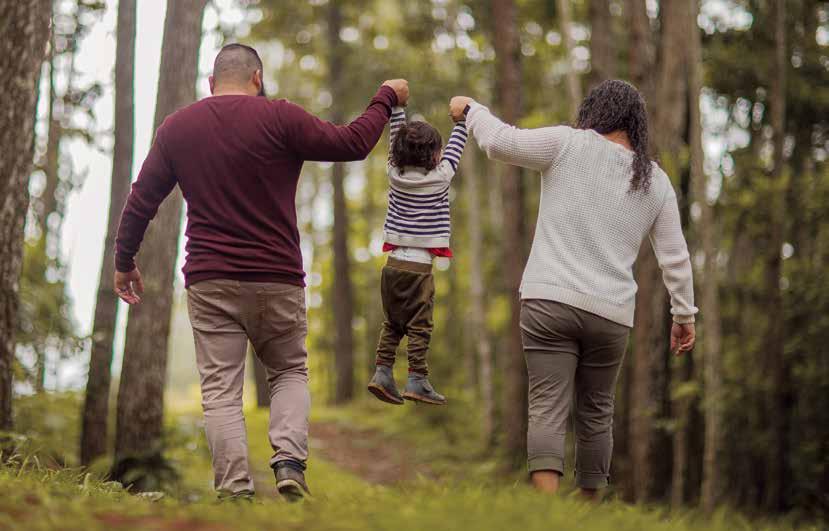
9 minute read
healthy kids
Raising Resilient Kids
How to Help Them Bounce Back
Advertisement
by Ronica O’Hara
In these turbulent times, children need to know how to confidently weather and deal with changes no matter what life hands them, say many psychologists. Studies show that when kids are resilient—having the ability to recover quickly from difficulties—they are less fearful and anxious, more confident and empathetic, and better able to handle cataclysmic events like 9/11.
Resilience can help them deal creatively with everything from cyberbullying to societal change. A Florida Atlantic University study of 1,204 children found that those that agreed with such statements as, “I can deal with whatever comes my way,” “I am not easily discouraged by failure,” and, “Having to cope with stress makes me stronger,” were less likely to be bullied in person or online and better able to cope when it occurred.
Resilience can be taught and learned at any stage in a child’s life, studies suggest. Some useful strategies include:
1Let them know they’re loved and supported. One stable, committed relationship with a supportive adult such as a parent, grandparent, aunt, teacher or coach is what a child needs to be resilient, according to research from Harvard’s Center for the Developing Child. This can be particularly important for children raised in less-thanideal circumstances. “It is absolutely critical for African-American children to learn resilience due to the current climate of hostility and racism, the inherent disadvantages in education and household income they are born into and hostile, crime-infested neighborhoods where they live,” says Damon Nailer, a Monroe, Louisiana, motivational speaker and author of Living, Loving, Leading. For children in all circumstances, he says, it’s important to
2Make resilience a household word. When San Diego child psychologist Bruce Thiessen’s daughter Kassidy was 4, he’d pretend to be the wolf in The Three Little Pigs, howling, “I’ll huff and I’ll puff and I’ll blow your house down!” She would reply, “Go ahead! I’ll rebuild it tougher and stronger!” It was his way of embedding resilience in her, which he and his wife Roxie have reinforced with books, movies and songs. “Making the theme of resilience dominant in multiple activities will them to figure things out on their own builds resilience,” says
make an enduring, indelible impression on your child,” he says. 5 Teach thankfulness. Feelings of gratitude bolster resilience,
3Be a good example. “The most important thing to cultivate resilience, mindfulness and any other emotions really, is for parents to practice and model these things themselves,” says Christopher Willard, Ph.D., a Harvard lecturer and author of Raising Resilience: The Wisdom and Science of Happy Families and Thriving Children. Adults need to bounce back from setbacks, whether it’s a social media mistake or a lost job, and find ways to reframe what happened in a positive light. To convey that in your day? The thorn? What did you learn? What would you do differently next time?” The parent can model responses to these questions by sharing their own rose and thorn. 4 Let them figure things out. “As tempting as it may be to step in every time you see your children struggling, allowing Katie Lear, a Davidson, North Carolina, therapist specializing in childhood anxiety. “On the flip side, when a parent hovers or immediately steps in to solve a child’s problem, the child may interpret that behavior as, ‘I don’t trust you to be able to do this without help.’” Asking a child how they plan to solve a problem rather than questioning why the problem happened in the first place is a way to teach them creative problem-solving, advises Lynn Lyons, a Concord, New Hampshire, psychotherapist and co-author of Anxious Kids, Anxious Parents.
attitude to a child, ask at dinner or bedtime, “What was the rose
studies show. For example, college students that performed gratitude-inducing exercises reported feeling better able to handle academic challenges. “Teach your child to look for the gift within every problem,” advises C.J. Scarlet, author of Heroic Parenting: An Essential Guide to Raising Safe, Savvy, Confident Kids. “That’s often hard to do in the midst of challenges, but just knowing there will be a gift found at some point can help your child to ride out the storm with greater patience and confidence.”
Ronica O’Hara is a Denver-based health writer. Connect at OHaraRonica@gmail.com.
You have to motivate yourself with challenges. That’s how you know you’re still alive. ~Jerry Seinfeld
293 LINDEN STREET | FALL RIVER MA | 508-678-1233

Dr Laura Bomback Clinical Nutrition/Chiropractic
Nutrition Response Testing may be what you’ve been looking for…answers to:


• Digestive Problems • Anxiety/Depression • Fatigue • Skin Problems • Weight Problems • Allergies • Joint/Muscle Pains • Mystery Illnesses
www.drbomback.com

I see….
401-359-7937

…..In yourfuture
www.saltitude.net
Meditation, Relaxation, Halotherapy Classes&SpecialEvents 204FrontSt. Lincoln, RI
Resiliency Wanted

Helping Families Rise Above Today’s Challenges
by Wendy Fachon and Debbee Radcliff
Parents, teachers and children are wondering how they can be successful in the upcoming school year. The memory of juggling work and family responsibilities throughout the school day is still fresh. The stressful state this memory produces has many realizing their former ways of dealing with stress are not working and holding on until things go back to normal is not a possibility. Much of our lives continue to require change and constant adjustment. Resiliency may be just what is needed, but how can resiliency be developed? Parents that are tugged in different directions by work and family demands can easily become frustrated and stressed, leading them to wonder how to catch a break. To retain resilience, it is vital to make time to relax and recharge. In the face of a crisis, most adults tend to hold on until the crisis is over. The COVID-19 pandemic, however, has been going on for six months, without any clear indication as to when it will end or how schools will safely and effectively manage their classrooms. So, how can parents continue to sustain themselves and their families mentally and spiritually?
START WITH SELF-CARE; IT IS MUCH EASIER TO GIVE FROM A FULL WELL.
Parents are their children’s first teachers, and children pay attention to their caregivers and their environment. So, parents and caregivers need to take care of themselves during this time. One suggestion is for parents to perform mini resets, choosing several times throughout the day to take three- to five-minute breaks. A break might consist of standing and stretching, stepping outside, taking a quick walk, doing a couple of yoga poses, listening to some favorite music or spending five minutes doing breathwork or meditation. In taking periodic breaks, parents do two things: they build their own resiliency, and they model for their own children the importance of having reset strategies.
LIMIT EXPOSURE TO THE LATEST NEWS.
This is a particularly unsettling time for children, and like sponges,
they pick up on everything. They want to know what is going on and why. While parents rely on phone conversations, online chats, social media and news channels to remain socially connected, it is important to be mindful of setting the proper time and place for these activities. When talking about what is happening with children, remember to use language they can understand and information they can handle.
BE PRESENT IN THE MOMENT.
So many of the decisions we are being asked to make are brand new. One of the easiest ways to handle these circumstances is by being present; decide how to handle situations as they arise based on the information available at the time. Children pay attention to not only the words they hear, but they watch how the adults around them react. Be present with your child. Get curious about what they know. Help them to understand what is going on in a way they can handle. For example, children may know school is different, but they may not realize why it is different. They may be sad. It helps to let them know their feelings are valid and they are loved and supported. It helps to ask them how they might solve the present problem. Talking about problems with a supportive adult will help children to make better decisions and adjustments in the moment, and this will teach them invaluable life skills.
Chiropractic for Body,
PRACTICE GRATITUDE AND CURIOSITY.
Focusing on gratitude cultivates a positive outlook and increases the opportunity to bring about a positive outcome. Curiosity is another tool that can be used to turn the tables on a negative situation to have a more positive outcome. A simple exercise is to ask a question out loud and be curious about how the answer will come. It’s all about perspective.
Debbee Radcliff, M.Ed, RMT, founder of Creatigo, is a special education teacher and holistic arts professional with more than 25 years of experience. Radcliff offers virtual workshops, and her style and professional training ease stress associated with the typical experience. She creatively combines holistic practices with research for a personalized approach. For more information, contact Debbee Radcliff at 401-793-0097 or visit Creatigo.org. See ad on page 29.
Wendy Fachon is an environmental educator, a regular contributor to Natural Awakenings magazine and host of the Story Walking Radio Hour. She appreciates the power of words and helps people share their remarkable stories and ideas through writing and radio. To learn more, call 401 529-6830, email StoryWalkerWendy@ gmail.com or visit StoryWalking.com. See ad on page 13.
Country Club for Dogs & Cats

Our Mission Statement: Our primary goal is to give your pet a happy and safe boarding experience, this will enable you, our most valued client, to enjoy your time away from home, content that your pet is receiving the best care possible. In providing such top quality boarding and grooming this facility will be his/her “HOME AWAY FROM HOME”.
Young or Old…Big or Small….We love them All!
Complimentary Consultation 215 Cottage Street, Pawtucket, RI 02860
191 Ten Rod Road (Route 102), Exeter Delmyra.com 401-294-3247
Attorney at Law STEPHEN J. DENNIS
Office 401-453-1355 Free Consultations Call Today
• Workers’ Compensation Bene ts • Personal Injury
we will work with you to nd solutions
DrPatOn eBack.com
and overcome challenges.

Mind and Spirit


Gentle With POWERFUL RESULTS
Call to schedule a WHOLISTIC CHIROPRACTIC CENTER


Patricia Hogan-Casey, D.C.
4017254380 StephenJDennis.com
Catch the Ocean State’s Wave of Healing






